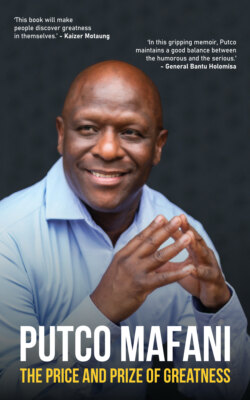Читать книгу Putco Mafani: The Price and Prize of Greatness - Putco Mafani - Страница 11
На сайте Литреса книга снята с продажи.
GRACE FOUR
ОглавлениеArmed with stones, we soldiered on
As I have said, in 1975, I entered Tinis Higher Primary and did my Grade 5 (Standard 3) under a great disciplinarian and tremendous leader, my principal, Mr Phillip Themba Dlepu. He saw something in me that few teachers saw. He encouraged me to develop myself as a public speaker.
When the new school building was officially opened by the Department of Bantu Education and Training, I was chosen to write and recite a poem on the day. This was an opportunity that I welcomed. Mr Owen Nel, an inspector from the department, attended the opening. There were no other dignitaries except for the principal and the teaching staff, but in those years the teachers were held in much higher regard than today and were dignitaries enough.
My teachers were passionate, dedicated and loyal. We gave them all interesting nicknames. Sir Thoz Nyakatya was called ‘Tishar’ uMerere’, Mr Mondli Nohashe was ‘uMhlohli, Mr Mahlasela was ‘Voltooi’, Mr Masiza was nicknamed ‘iDada’, and Mr Zolile Tolaman January was lovingly referred to as ‘iBhokhwe’.
Although the school building was new, just as today there are still pit latrines at many rural schools, in those days there were no flushing toilets. Nor did we enjoy the luxury of toilet paper. We boys invented alternatives. Sometimes a page torn from an old book. Sometimes old newspapers from the staff room. If these were in short supply, then you would use the corner of the wall. Ha! Or find the nearest stone. But it must be a smooth one.
I remember the bucket system we used in the township. The challenge was that sometimes the buckets were not picked up on time, and they would be left on the streets. We had to suffer the stench in disgust as we waited for the municipal employees to pick them up. We referred to these workers as ooSomprayi. Usually, ooSomprayi would collect the bucket from the back of your house without even greeting you and take it to the street to empty it into the truck. Of course, the pleasure and comfort of using toilet paper was a luxury to be enjoyed by some of the elderly, if they had it. The use of old newspapers was a common phenomenon for most of us.
In my second year at the school, the country was set on fire by the uprisings in Soweto and we were deeply affected, like most black townships.
What made students run riot was the feeling that enough was enough. We were tired of being taught in Afrikaans. Maths was not very easy for most of the students, and can you imagine when it is taught in Afrikaans as Wiskunde, and Agriculture as Landbou. During the uprisings, a few of my friends were arrested. More and more were involved in politics. I would be found in the company of those who discussed politics after school. This made my mother concerned about my future, especially when many disappeared at the hands of the brutal police and Special Branch cops of the vicious apartheid system. Or were killed. Or went into exile. Vuyisile Biko never came back from exile. This was someone who led our section of the movement and he was one of the leaders of the 1976 uprisings. Some of my friends skipped the country and were recruited by the Azanian People’s Liberation Army and Umkhonto weSizwe into the struggle for liberation.
Looking back, I don’t know if it was more painful to be a parent of a child at school or a child at school. We were naive but responded to the cruelty of the state. Parents knew all too well that the state did not value the life of a black child. We could be mowed down at any time. But armed with stones, we soldiered on.
Teachers, being in the employ of the state, had a difficult time opposing the regulation to teach in Afrikaans. Many of them could not speak the language well, yet it was the medium of instruction.
It was scary when the security forces used live ammunition instead of rubber bullets to disperse crowds. And as young people we could not tell immediately when live ammunition was being used. Some classrooms were burnt down, and our glorious new school building was damaged, but the police arrived in time to save the larger part of the school.
The prospects of bright young boys skipping the country or disappearing led my aunt, Mrs Griesel Rojie, to convince my mother to send me to the Seventh-Day Adventist private school, Bethel College, in Butterworth. Griesel arranged all the application forms for me and my two cousins, Nokuzola Mafani and the late Mpendulo Rojie.
Putco’s padkos
On the matter of the uprisings of the mid-1970s: over and above being armed with stones as boys against soldiers of the brutal state, many of us were armed with belief. Though apartheid affected the trajectory of many of my peers negatively, including me, it was not going to stop our lives. I say to you, there is nothing in this world stopping you from being what you want to be, except yourself. If you want it, work for it. You already have the greatness of a leader in you. And the world could always benefit from another great one, so reflect on your life journey and story. Through my story, see yours. Today’s youth faces a new set of challenges, being drugs and alcohol, COVID-19 and gender-based violence (GBV), that has to be overcome by all young men and old ones.
